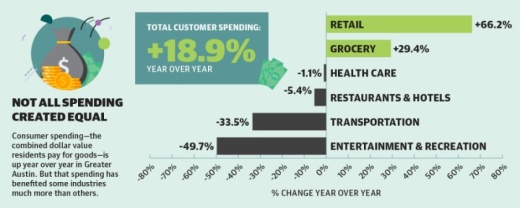Austin has not been immune to the national economic recession caused by the COVID-19 pandemic. Local businesses from Vulcan Video in South Austin to Magnolia Cafe's downtown location have cited the pandemic as a reason for closures as the virus has continued to take its toll.
While hope is on the horizon with vaccines arriving for certain groups, public health officials have said that supply is still limited, which means businesses will continue to have to take safety precautions under state and local orders for the foreseeable future.
However, there are signs Austin's economy has not seen as pronounced a blow as have some other areas of the country, and the city could be poised to recover more quickly than others once the vaccine arrives for the general population.
The Austin metropolitan area's December unemployment rate was 5.1%, lower than the 6.6% national rate and the 7.1% rate in Texas, but still double the city's December 2019 rate.
Employment data is not the only indication that Austin's economy is outperforming those of the city's peers. For the week ending Jan. 3, consumer spending in Austin is up 18.9% year over year as compared to a 2.8% dip nationally and a 4.2% drop in Texas, according to data from Opportunity Insights, an economic and policy research organization based in Harvard University.
"While Austin hasn’t been able to escape the downturn we’ve seen nationally, it’s been much more modest than in both Texas and the United States," said Sarah House, Wells Fargo Securities senior economist and director, the Austin Chamber of Commerce's economic forecast webinar in November.
According to House, Austin's ability to escape the drastic economic declines seen in other communities has come down to its mix of industries and its continued ability to attract new business. The technology and professional services industries, which have strong presences in Austin, were relatively unaffected by the pandemic and have been more able to have employees work from home, while Oracle and Tesla, among other such companies, have recently announced relocations to the area that will bring additional jobs.
However, while many of Austin's economic indicators remain strong, data shows that much of the spending in the local area has not benefited local businesses. Small-business revenue in Greater Austin was down by 44% year over year as of Dec. 30, according to Opportunity Insights—lower than the national average of a 32.1% dip and the Texas average of a 39.1% decrease.
"Even as we’ve seen generally strong employment and spending, we’ve seen a disproportionate hit in terms of small businesses open," House said.
This story is part of Community Impact Newspaper's Annual Community Guide, which takes a look at the biggest development, education, health care, education, government and local business stories for the year ahead.





